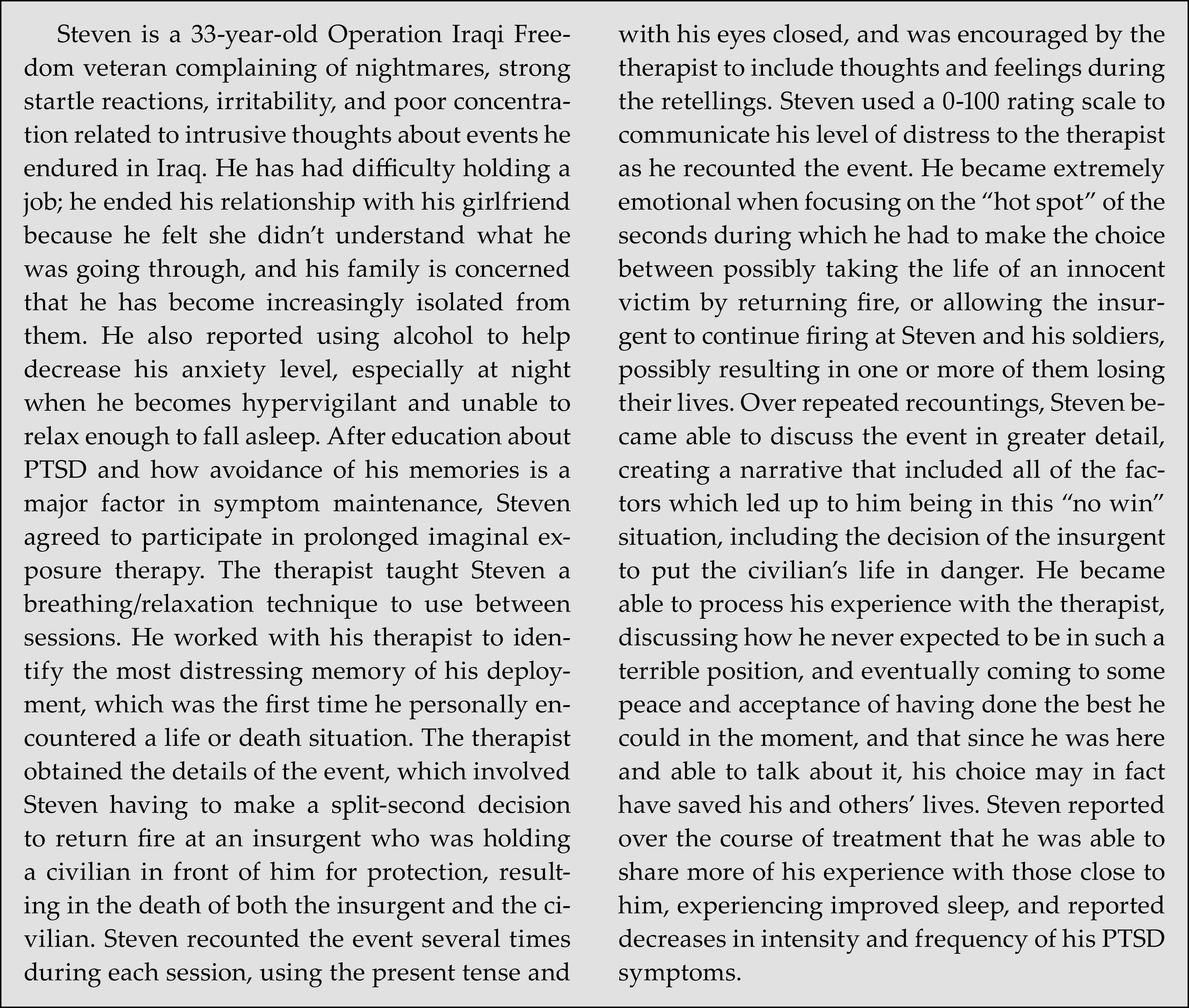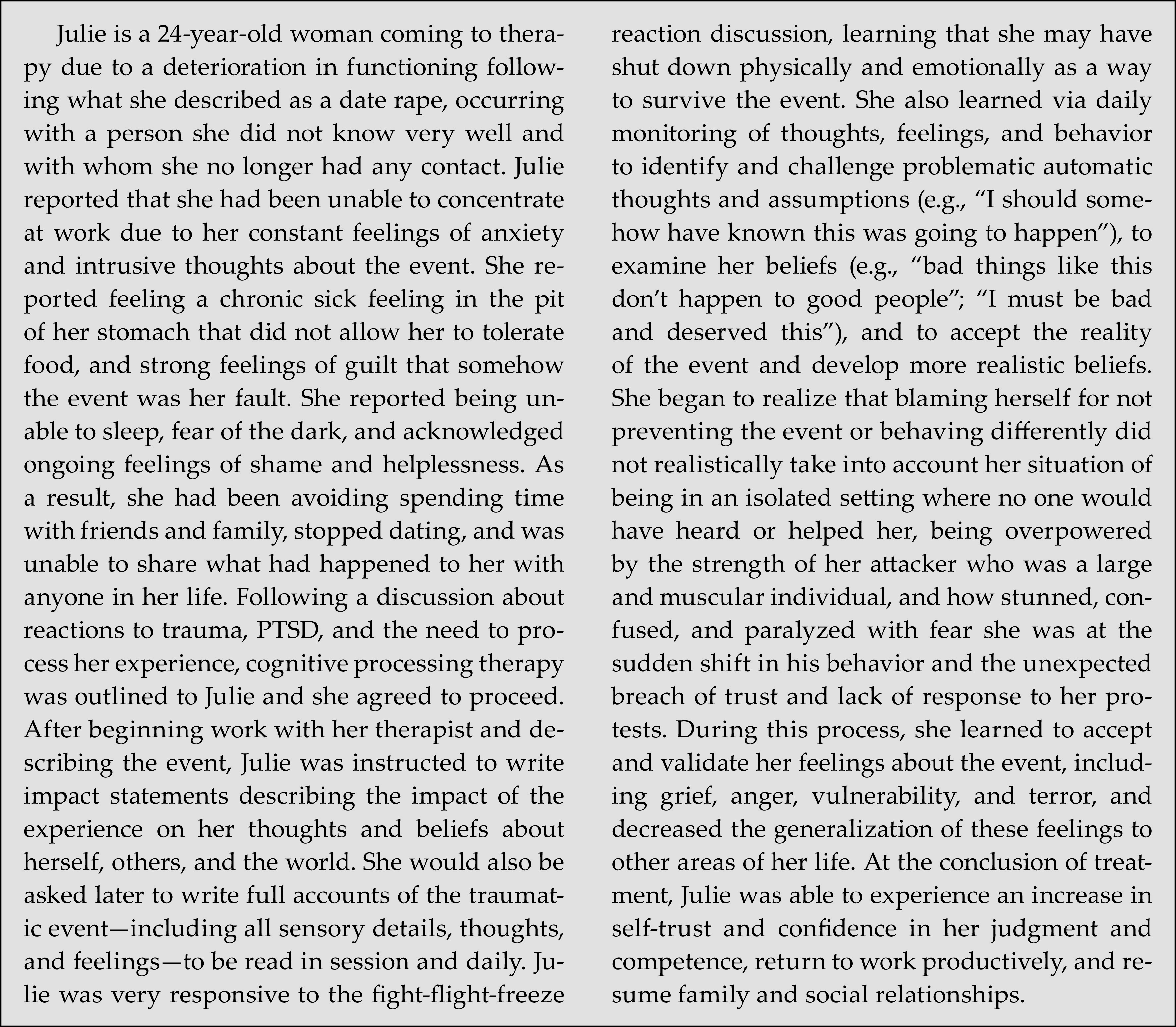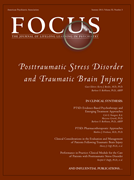Although there is strong evidence for various forms of trauma-focused CBT for PTSD, many patients fail to respond to treatment, making it increasingly important to innovate and study novel treatment approaches. While the majority of PTSD patients will respond to treatment, results from rigorous meta-analyses of psychotherapy and pharmacotherapy RCTs for PTSD suggest that a significant minority will maintain their PTSD diagnosis, or worse, fail to respond to treatment (
3,
13). We will now present several novel approaches that have shown promising evidence for treating PTSD but may have their unique limitations as well (e.g., the potential for abuse with MDMA/ecstasy as a cognitive enhancer).
Medication-Enhanced Psychotherapy (MEP)
Still relatively novel, there is emerging evidence for various MEP approaches from several RCTs. Essentially, MEP involves some combination of a drug with psychotherapy. The approaches used vary from medications that may contribute additional benefit to others designed to facilitate the psychotherapy without directly targeting PTSD symptoms. Thus far, the most well studied MEP approach is SSRI-augmented prolonged exposure, which has shown mixed yet promising results in three published RCTs. The initial RCT first assigned each patient to sertraline, later randomizing to continued sertraline alone or sertraline combined with prolonged exposure, finding that only partial SSRI responders experienced added improvement when receiving prolonged exposure (
28). Next, Simon and colleagues found no additional benefit of adding an SSRI to patients that initially received prolonged exposure (
29). Administering an SSRI and prolonged exposure simultaneously, Schneier and colleagues’ more recent RCT found paroxetine and prolonged exposure together superior to prolonged exposure alone (with placebo), although differences disappeared at the follow-up assessments (
30). These studies are difficult to compare because each used a different design; however, psychotherapy such as prolonged exposure may be useful for those who fail to respond to SSRI pharmacotherapy. Furthermore, the fact that simultaneous treatment with an SSRI and prolonged exposure showed initially positive results is consistent with anecdotal clinical evidence that many patients in psychotherapy trials are often already taking SSRIs or other psychiatric medications.
Cognitive enhancers are the most commonly used of the MEP approaches that aim to make the psychotherapy more effective without acting directly on PTSD symptoms.
d-Cycloserine, an antibiotic originally used for treating tuberculosis, heightens glutamate activity and cell change processing in brain pathways associated with fear memory and extinction learning (
31). The most commonly studied cognitive enhancer for PTSD treatment, with seven active studies (clinicaltrials.gov),
d-cycloserine augmentation with prolonged exposure has shown mixed results in two published RCTs for PTSD, despite promising initial findings (
32). While de Kleine and colleagues found that
d-cycloserine augmented prolonged exposure patients were more likely to respond to treatment and that more severely symptomatic patients exhibited superior improvement gains than patients receiving PE with placebo (
33), Litz and colleagues’ results of an RCT of
d-cycloserine and prolonged exposure were entirely negative (
34). Perhaps further replication will provide more consistent, positive results for
d-cycloserine MEP, but it could be a viable alternative treatment for difficult to treat populations. Based on their efficacy in extinction training, the other cognitive enhancers theorized to be used as MEP for PTSD are hydrocortisone, yohimbine, and methylene blue. These medications currently have no clinical data for PTSD treatment but have four ongoing PTSD treatment trials (
35).
Although, like
d-cycloserine, methylenedioxymethamphetamine (MDMA or ecstasy) as a form of MEP is thought to facilitate psychotherapy, its theorized mechanism of action is entirely different. Specifically, MDMA boosts serotonin levels, thereby decreasing inhibition, increasing empathy, and creating a sense of euphoria, effects which may promote more active engagement in psychotherapy, exposure in particular (
35). Currently, only two RCTs of MDMA augmented psychotherapy for PTSD have been published, both examining treatment resistant populations, with some conflicting results. While 83% of MDMA MEP patients responded to treatment in the first such RCT (
36), the most recent study did not find statistically significant improvement but did observe clinically significant improvement (
37). Because MDMA’s behavioral effects are rather conspicuous, researchers in these studies may not have been truly blind to the patient’s randomization assignment, thereby potentially influencing the results (
35). Should researchers, however, be able to find that the potential risk from neurotoxicity of MDMA is minimal and find ways to safely administer MDMA outside of a highly controlled research setting, then this MEP approach could prove very promising.
Complementary and Alternative Medicine (CAM)
Complementary and alternative medicine (CAM) interventions include therapies not considered to be standard practice in the United States, but are considered part of traditional medical practice in other parts of the world and are widely used by consumers (
47). Evidence-based treatments may carry issues of acceptability, appropriateness, accessibility, and the stigma of a mental health clinic setting. Accordingly, CAM approaches have risen in popularity as evidenced by the 438 unpublished, recently completed, or ongoing studies (
47). Surveys estimate CAM therapy usage at approximately 36%–38% in the general population and 45% in active duty military, who most commonly use massage and relaxation for stress and pain management (
48). Ninety-six percent of VA specialized PTSD treatment programs report use of at least one CAM treatment (
49).
In response to the rising popularity of CAM treatments, Strauss and colleagues (
46) reviewed the RCTs of CAM for PTSD, finding most of the studies of poor quality. Promising results have been found for meditation, acupuncture, and relaxation for improving PTSD symptoms; however, with the exception of the data on acupuncture, studies were methodologically flawed due to a lack of control groups, unclear randomization and blinding procedures, and small sample sizes (
49,
50). Other popular approaches such as yoga or service animals are lacking in empirical data (
40). For now, CAM techniques may best be utilized as ancillary approaches for patient self-care, but more evidence is needed before they can be recommended as stand-alone treatments.



